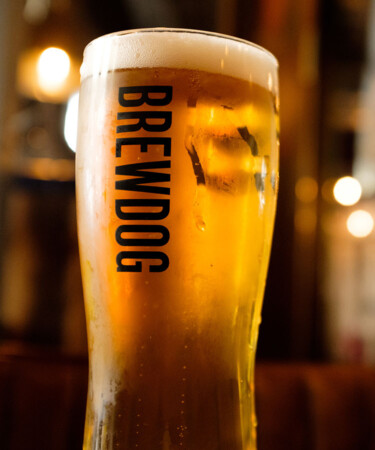One of BrewDog’s co-founders is stepping away from the company, according to a Friday report from U.K. publication “The National.” Martin Dickie, who founded the Scottish craft beer brand with James Watt in 2007, unexpectedly announced his departure in an email to the staff, citing personal reasons.
“This business has been my life for the last 18 years and I have enjoyed (almost) every minute,” he shared in the email. “I have been inspired by and loved working with and learning from so many interesting people who have worked in our business over the years from all over the world.”
Though the rebellious beer brand quickly rose to fame, Dickie’s departure follows a long string of struggles for BrewDog. The company announced last month it would close 10 of its bars due to industry challenges. And earlier this week reports surfaced that BrewDog beers were removed from about 2,000 pubs across the U.K. The brewery’s most popular beer, the Punk IPA, was removed from 1,980 pubs, marking a 52 percent decline in distribution. One brand cutting ties with BrewDog is Loungers, a U.K. bar chain that claims it’s replacing BrewDog beers with competitors like Camden Town and Beavertown instead.
“It’s going to be a tough battle. I do think the brand is probably going to really struggle to establish the kind of relevance it probably had 10 years ago,” Loungers CEO Alex Reilley told “The Telegraph.”
This also comes after Watt, Dickie’s fellow co-founder, stepped back from the company last May, following a series of allegations regarding the company’s culture. In June 2021, over 100 former employees accused Watt of creating a “culture of fear” in the workplace in an open letter.
“You have inflated egos and fostered a culture within craft beer that deifies founders, and gives weight to sexist and misogynistic brewers who claim to be standing up for free speech,” the letter claimed. “You have become a lightning rod for some of the worst attitudes present on both the internet, and in real life.”
Dickie’s departure is the latest blow to BrewDog, and with its current financial struggles, it’s unclear what the future holds for the brand. Though the industry as a whole is facing a number of challenges, it’s possible that Brits are just bored with the BrewDog schtick.
VP Pro Take
In Silicon Valley, there are two main types of start-up founders: business founders, and technical founders. Ideally, they find each other, with the latter’s coding skills and hands-on production complementing the former’s fundraising charisma and big-picture vision. This isn’t always the case in the brewing industry, but it was the case at BrewDog, with Dickie doing the brewing and Watt charming the press (not to mention thousands of “equity punks” along the way.) “I’m responsible for production and James is in charge of all the other things,” Dickie told The Scotsman in a 2014 interview. “That’s one of the best things about it.”
But all good things come to an end, and while plenty of the embattled Scottish firm’s critics would no doubt quarrel over just how “good” the partnership had been for anybody beside those two and their bank accounts, it has now come to an end, as well. Officially, at least. Unofficially, the self-styled Bad Lads o’ Lager appeared to be grinding through an unspoken divorce for at least the past half a decade. When I first started reporting on BrewDog, about 10 years ago, Dickie was still an active participant in the firm’s notorious — and depressingly effective — publicity stunts. But as I began investigating its Equity for Punks crowdfunding scheme in early 2021, I was struck by how much of BrewDog’s narrative had come to reflect Watt’s singular public persona, rather than their scrappy Scottish start-up partnership. His absence only became more conspicuous as Watt became more noxious to his workers, former fans in the media, and even some rank-and-file “punks.”
“We need a photo of Martin Dickie holding today’s newspaper for proof-of-life,” I joked to a colleague a couple years ago, as Watt floundered and BrewDog’s scandals really began to spill out. The technical cofounder was barely in the picture.
We don’t know what we don’t know. Maybe Dickie and Watt remain fast friends to this day, and his departure is a strictly personal matter. It’s not impossible: two decades is a long time to do anything, and his interest had clearly wandered beyond beer. (See: his £20-million medical cannabis investment last month.) But neither is it possible to ignore that BrewDog’s outlook has dimmed enormously ever since its shelved public listing in 2020. Its swashbuckling brand has been damaged by controversy. Its business model of building a far-flung empire of taprooms has stagnated. It has not turned a pre-tax profit since 2019. Dickie’s departure is just the latest in a series of high-profile leadership exits, including Watt’s own: he resigned as BrewDog’s chief executive in 2022, though he remains a non-executive director and its largest individual shareholder.
For years, the cofounders were fond of referring to their brewery as the “Good Ship BrewDog,” but having steered it into heavy seas, they were forced to relinquish the helm to steadier hands. Now, both have headed for the lifeboats. Whether the souls aboard — workers, private-equity investors, and “punk” bagholders — find smoother sailing in their absence remains to be seen. —Dave Infante, VinePair columnist and contributing editor
This story is a part of VP Pro, our free content platform and newsletter for the drinks industry, covering wine, beer, and liquor — and beyond. Sign up for VP Pro now!
